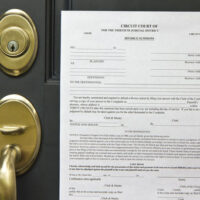What Happens if You Ignore a Divorce Complaint?

Divorce is a legal process and as such, there are very specific steps a person must follow. The person that wishes to file for divorce first will file a complaint with the court, which triggers the start of the case. Once the complaint is filed, the non-filing party will be served it. In New Jersey, a sheriff or process server is required to make service. The other party has a specific amount of time from the time that he or she receives the complaint to respond, but that does not always happen. Sometimes people cannot deal with the thought of divorce, or they genuinely become busy and they simply do not get around to it. So, what happens if you do not respond to a Divorce Complaint?
The Divorce Will Continue
A divorce case will proceed even when you do not respond to a complaint. Filing for divorce is filing a lawsuit and while you are provided with the chance to respond, it does not mean you have to. If you ignore the complaint, the lawsuit will resume and the case can be finalized without your appearing in court.
For some, this seems to be the ideal situation. They do not want to deal with the hassle of the divorce, not to mention the emotions, and so they are happy that they will not have to face their spouse in court. However, when you fail to appear in court, it can have other negative impacts on your life.
Why You Should Respond to a Divorce Complaint
It is true that you are not legally obligated to respond to a Divorce Complaint, but that does not mean you should ignore it. Responding provides you with a chance to refute the claims made by your spouse within his or her complaint and to tell your side of the story.
After you respond to the complaint, you will receive a notice with the date of your first court hearing. At this hearing, and throughout the entire divorce process, you will have the opportunity to present arguments as to why you should be awarded child custody, support, alimony, and certain assets and/or responsibility for marital debts that are important to you.
To do this though, you need to respond to the initial complaint. If you do not, you may not secure any of the favorable terms you were hoping for. Additionally, if your spouse makes a motion for exclusive possession of the marital home, you may even have to move if you still live in the house.
Our Philadelphia and New Jersey Divorce Lawyer Can Assist with Your Response
It may be tempting to ignore a Divorce Complaint after being served, but it is crucial that you do. At the Law Offices of Lauren H. Kane, our Philadelphia divorce lawyer can help you prepare your response and represent you throughout the process to ensure your rights are upheld. If you are getting a divorce, call us at (215) 918-9453 or contact us online to schedule a meeting with our skilled attorney and to learn more about how we can help.
